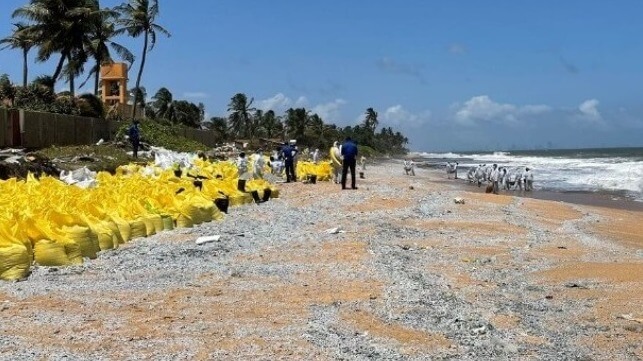Study: Plastic Pollution is "The Oil Spill of Our Times"

A group of environmental advocates have carried out a lab study on samples of the plastic debris from the wreck of the X-Press Pearl, which burned and sank off Colombo, Sri Lanka last year. The vessel was carrying nearly 1,700 tonnes of plastic pellets, or nurdles, and it released a substantial quantity into the environment when it sank. According to a UN assessment team, it was the largest plastic spill event in history.
Some of the plastic washed up on shore intact, and other components arrived in burned or partly-burned form. The small size and massive number of the particles has made cleanup extremely challenging, and burned pieces - which often look like organic matter - have proven exceptionally difficult to remove.
With financial support from the Swedish government and the Rockefeller Foundation, two groups - Sweden's International Pollutants Elimination Network (IPEN) and Sri Lanka's Centre for Environmental Justice (CEJ) - have analyzed samples of intact and burnt plastic debris from the ship for potentially hazardous pollutants.
The advocates found concerning results in the debris, particularly in partially-burnt lumps. Lead and cadmium were detected in the burnt debris, along with elevated levels of polyaromatic hydrocarbons (PAHs). In many of these samples, PAH concentrations exceeded EU limits for consumer products.
"The concentrations were so high that they were up to six times higher than the [EU] REACH limit values for individual PAHs in products for adults and twelve times higher than the limit values for products for children, meaning that any direct or repeated contact with these lumps should be avoided, especially since seven of the PAHs found in these samples are listed as possibly carcinogenic," IPEN and CEJ wrote.
Given the diverse health hazards in these products, IPEN science and technical advisor Therese Karlsson suggests that it is time to treat complex cargo spills like the X-Press Pearl disaster as "the oil spill of our times."
"Historically, a lot of shipping regulations have been directed towards the prevention and mitigation of oil spills. Considering that today’s container ships are transporting more and more complex mixtures of chemicals and plastics it is crucial that the convention for the new time reflects these challenges and is enforced in a way that actively prevent spills of toxic chemicals, plastics, and oil," IPEN concluded.
The long-term health and environmental effects of the spill are unknown, but it did have an immediate economic impact. The nurdle relesae prompted the Sri Lankan government to temporarily close the area to fishing, with a negative impact on local fishermen. “This accident has affected around 7,000 families engaged in fishing. They lost their livelihoods. Not only fishermen, but also those attached to the fishing sector such as people making dry fish, and people selling fish, were affected," local organizer Reverend Sarath Iddamalgoda told CEJ.
